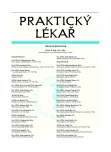Zoonoses, psychiatric disorders and their importance in clinical practice
Authors:
S. Racková 1; L. Janů 1; Z. Karimová 2
Authors‘ workplace:
Lékařská fakulta univerzity Karlovy v Plzni
; Psychiatrická klinika
Přednosta: doc. MUDr. Jiří Beran, CSc.
1; Lékařská fakulta univerzity Karlovy v Plzni
obor všeobecné lékařství, 5. ročník
Děkan: doc. MUDr. Jaroslav Koutenský, CSc.
2
Published in:
Prakt. Lék. 2010; 90(2): 74-78
Category:
Reviews
Overview
Psychiatric disorders are some of the most common and serious diseases in society and very often run a periodic course. There are several factors associated with the aetiology of psychiatric disorders such as genetic changes, the influence of stress factors, or changes in neurotransmission. Infectious diseases are another of the risk factors associated with the aetiology of psychiatric disorders. Certain zoonoses have the ability to infect the central nervous system and to modulate neurotransmission, thereby affecting mood and behaviour. In this article we describe a number of zoonoses that are associated with psychiatric disorders and that occur in our region. We suggest when it is appropriate to consider zoonoses as a factor and discuss their role in the aetiology of psychiatric disorders.
Key words:
zoonoses, depression, schizophrenia, Toxoplasma gondii, Borrelia burgdorferi, Borna disease virus
Sources
1. Bode, L., Ludwig, H. Borna disease virus infection, a human mental-health risk. Clin. Microbiol. Rev. 2003, 16(3), p. 534-545.
2. Bode, L., Reckwald, P., Severus, W.E. et al. Borna disease virus-specific circulating immune complexes, antigenemia, and free antibodies-the key marker triplet determining infection and prevailing in severe mood disorders. Mol. Psychiatry 2001, 6(4), p. 481-491.
3. Bojar, M. Neuroborrelióza-současné názory na patogenezi, diagnostiku a léčbu. Interní medicína pro praxi 2002, 4, s. 154-160.
4. Chalupa, P. Zoonózy. [on line]. III. klinika infekčních a tropických nemocí FN Na Bulovce a 1. LF UK. 19. 10. 2005, aktualizace 30. 1. 2006 [cit. 2009-12-10]. Dostupný na WWW: <http://www 1.lf1.cuni.cz/~hrozs/zoopch1.htm>
5. Esquiel, C.A., Quinones, O.P.A., Valenzuela, M.A.A. et al. Seroepidemiology of Toxoplasma gondii infection in psychiatric inpatients in a nothern Mexican city. BMC Infect. Dis. 2006, 6, p. 178.
6. Dietrich, D.E., Schedlowski, M., Bode, L. et al. A Viro-psycho-immunological disease-model of a subtype affective disorder. Pharmacopsychiatry 1998, 31, p. 77-82.
7. Dietrich, D.E., Bode, L., Spannhuth, C.W. et al. Amantadine in depressive patients with Borna disease virus (BDV) infection: an open trial. Bipolar. Disord. 2000, 2, p. 65-70.
8. Garcia-Monco, J.C., Seidman, R.J., Benach, J.L. Experimental immunization of Borrelia burgdorferi induces development of antibodies to gangliosides. Infect. Immun. 1995, 63(10), p. 4130-4137.
9. Hájek, T., Libiger, J., Janovská, D. et al. Clinical and demographic characteristics of psychiatric patients seropositive for Borrelia Burgdorferi. Eur. Psychiatry 2006, 21, p. 118-122.
10. Hájek, T., Pašková, B., Janovská, D. et al. Higher prevalence of antibodies to Borrelia Burgdorferi in psychiatric patients than in healthy subjects. Am. J. Psychiatry 2002, 159, p. 297-301.
11. Halonen, S.K., Lyman, W.D., Chiu, F.C. Growth and development of Toxoplasma gondii in human neurones and astrocytes. J. Neuropathol. Exp. Neurol. 1996, 55, p. 1150-1156.
12. Jedrzejewska, D., Iwaszko, D., Perzynski, J. et al. Psychiatric disorders in borreliosis. Ann. Univ. Mariae Curie Sklodowska Med 2006, 61(2), p. 724-727.
13. Kapla, J. Nově se objevující nákazy. Vojen. Zdrav. Listy 2007, 76, 1, s. 1-5.
14. Kohler, V.J. Lyme disease in neurology and psychiatry. Forschr. Med. 1990, 108, p. 191-194.
15. Ludwig, H., Bode, L. Borna disease virus: new aspects on infection, disease, diagnosis and epidemiology. Rev. Sci. Tech. Off. Int. Epiz. 2000, 19(1), p. 259-288.
16. Pašková, B., Hájek, T. Lymeská borrelióza a duševní poruchy. Psychiatrie 2001, 5, 1, s. 27-31.
17. Racková, S., Janů, L., Kabíčková, H. Borna disease virus circulating immunocomplex positivity and psychopathology in psychiatric patients in the Czech Republic. Neuroendocrinol. Lett. 2009, 30(3), p. 414-419.
18. Thomas, H.V., Thomas, D.Rh., Salmon, R.L. et al. Toxoplasma and coxiella infection and psychiatric morbidity: A retrospective cohort analysis. BMC Psychiatry 2004, 4(32): Published on-line. doi: 10.1186/1471-244X-4-32.
19. Tomková, J., Novotný, D., Bednaříková, J. a kol. Toxoplazmóza. Klin. Biochem. Metab, 2008, 16, 37, s. 232-235.
20. Torrey, E.F., Yolken, R.H. Toxoplasma gondii and schizophrenia. Emerg. Infect. Dis. 2003, 9(11), p. 1375-1380.
Labels
General practitioner for children and adolescents General practitioner for adultsArticle was published in
General Practitioner

2010 Issue 2
- Advances in the Treatment of Myasthenia Gravis on the Horizon
- Hope Awakens with Early Diagnosis of Parkinson's Disease Based on Skin Odor
- Memantine in Dementia Therapy – Current Findings and Possible Future Applications
- Possibilities of Using Metamizole in the Treatment of Acute Primary Headaches
- Memantine Eases Daily Life for Patients and Caregivers
-
All articles in this issue
- Tick-borne meningoencephalitis
- Zoonoses, psychiatric disorders and their importance in clinical practice
- Advance directives in Europe
- Cardiac complications of chronic obstructive pulmonary disease
- The COPAT project – current options for the treatment of childhood obesity in the GP‘s surgery
- Do our patients remember cardiovascular risk factors?
- Substance abuse preventinon and approaches to managing of cure dependence
- Acute aortic dissection in pregnant women with Marfan syndrome
- Treatment of refractory overactive bladder
- Radicular syndrome in the general practitioner’s surgery
- Tracheal stenosis, diagnosis and treatment options
- Differential diagnosis of oedema
-
Evolution and evolutionary theory for physicians. II.
Evolution – a scientific fact
- General Practitioner
- Journal archive
- Current issue
- About the journal
Most read in this issue
- Tracheal stenosis, diagnosis and treatment options
- Radicular syndrome in the general practitioner’s surgery
- Differential diagnosis of oedema
- Substance abuse preventinon and approaches to managing of cure dependence
